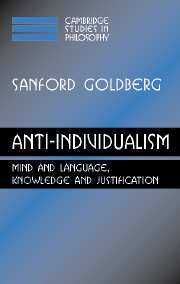Book contents
- Frontmatter
- Contents
- Preface
- Introduction
- Part I SEMANTIC ANTI-INDIVIDUALISM
- 1 The nature of knowledge communication
- 2 Public linguistic norms: the case from successful communication
- 3 Public linguistic norms: the case from misunderstanding
- 4 From public linguistic norms to anti-individualism regarding language and thought
- Part II EPISTEMIC ANTI-INDIVIDUALISM
- References
- Index
4 - From public linguistic norms to anti-individualism regarding language and thought
Published online by Cambridge University Press: 22 September 2009
- Frontmatter
- Contents
- Preface
- Introduction
- Part I SEMANTIC ANTI-INDIVIDUALISM
- 1 The nature of knowledge communication
- 2 Public linguistic norms: the case from successful communication
- 3 Public linguistic norms: the case from misunderstanding
- 4 From public linguistic norms to anti-individualism regarding language and thought
- Part II EPISTEMIC ANTI-INDIVIDUALISM
- References
- Index
Summary
OVERVIEW OF THE ARGUMENT
In the present chapter, my aim is to use the results of the previous two chapters to argue for three anti-individualistic doctrines in the philosophy of mind and language. These doctrines express anti-individualistic theses regarding speech content, linguistic meaning, and mental content/attitude individuation. The arguments themselves all share their basic structure: appealing to a thought experiment in which we vary the public linguistic norms in play while leaving intact all individualistic facts regarding the participants in a speech exchange, it is argued that these three properties – the content of the speech, the linguistic meanings of the expressions used, and the contents of the beliefs acquired in the exchange – will vary in a way reflecting the change in public linguistic norms. The result, of course, will be that the instantiation of the determinate properties in question is not fixed by the individualistic facts regarding the participants in a speech exchange. The facts regarding speech content etc. do not supervene on the set of individualistic facts regarding the speaker and hearer, respectively. (Putting the point in terms of supervenience connects our result with the standard way of formulating anti-individualistic doctrines.)
This sort of argument for anti-individualism will be familiar to readers of Putnam and Burge. But it is worth highlighting what I see are the three main differences.
First, the present argument motivates its anti-individualistic conclusions without appeal to the various premises used by Putnam and Burge.
- Type
- Chapter
- Information
- Anti-IndividualismMind and Language, Knowledge and Justification, pp. 102 - 130Publisher: Cambridge University PressPrint publication year: 2007



